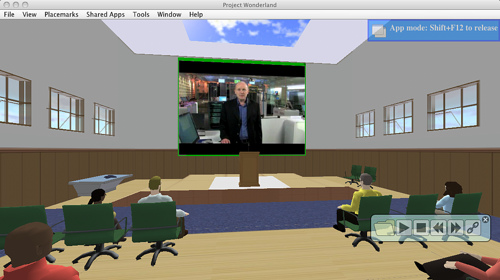Press Release: Open Wonderland Foundation Launch
St. Paul, Minnesota, March 10, 2010 – Today Ken Miller, the CEO of Virtual Learning Labs, announced the formation of the Open Wonderland Foundation and the creation of the Open Wonderland virtual world platform. The Open Wonderland platform is a “fork” of the Project Wonderland toolkit originally developed by Sun Microsystems Laboratories. Miller, who will serve as the Foundation’s first President and Chairman of the Board, explains that the non-profit Open Wonderland Foundation will provide direction and governance for Open Wonderland (http://OpenWonderland.org), a free and open source platform for creating 3D virtual worlds for education, business, and government applications.
Miller also announced that Nicole Yankelovich has accepted the position of Executive Director of the Open Wonderland Foundation. Yankelovich, who initiated and ran the Wonderland project during her tenure at Sun, will oversee the transition of the project. “While leadership of the Wonderland project is now in the hands of the Foundation and the open source community,” she explains, “many important aspects of the project will remain unchanged. Many of the original Wonderland core team members will continue to contribute to the open source project and the new leadership is more committed than ever to advancing both immersive education and business collaboration.”

Miller says he is pleased that Aaron Walsh, Grid Institute Director and head of the Immersive Education Initiative (http://ImmersiveEducation.org), has assured him that Wonderland will continue to be an official Immersive Education Initiative virtual world platform. “Both the platform and the content are open,” explains Walsh, “which is vital for education in both the short and long term.”
Others who have indicated they will continue to support Wonderland include Darwin Dimensions, the creators of Evolver (http://evolver.com), a compelling web site for creating avatars, including ones that can be used in Wonderland worlds. AmphiSocial (http://amphisocial.com), a provider of next-generation 3D collaboration and training environments, is also moving ahead with plans to use Wonderland as one of the platforms underlying their new product.
Unlike other open source projects that fork, there is no acrimony involved in this instance. On the contrary, the same people who were passionate about Project Wonderland, both from Sun and in the broader open source community, are taking the initiative to advance the technology under the Open Wonderland umbrella.

Among the Sun team members transitioning support to the new Open Wonderland project is Wonderland architect Jonathan Kaplan. “Now that we have the new open source project established on Google Code, we’re actively preparing for the next software release,” he reports. “This will be an incremental release that includes some important updates.” Since leaving Sun, other members of the team have been working on new modules to contribute to the Wonderland Module Warehouse – a clearinghouse for both free and commercial Wonderland extensions.
In addition to the former Sun employees, a group of dedicated Wonderland open source community members from around the world have pledged to support the new Foundation by donating their time to maintain web sites, create 3D artwork, teach tutorials, provide publicity, and help out in variety of other ways.
On the leadership side, Miller has put together a board of directors made up of an elite group of educators in the forefront of applying advanced technology, such as 3D virtual worlds, to teaching and learning. For example, Professor John Belcher from MIT makes extensive use of technology for 3D visualization in his Electricity and Magnetism courses. In addition, he was involved in starting the MIT OpenCouseware initiative to publish almost all MIT course material on the web. “One of the best things about Wonderland,” says Professor Belcher, “is that it is designed for collaboration. I was able to run our LabView application unmodified in a Wonderland world and allow groups of students to interact with it while viewing and discussing a dynamic 3D visualization. Thanks to the existence of the Foundation, I am moving ahead with confidence on my next project to bring our entire TealSIM physics simulation environment into Wonderland.”
Michael Gardner, another Open Wonderland Foundation board member from the University of Essex, was one of the first adopters of Wonderland. He and his colleagues created MIRTLE, a mixed reality solution which uses Wonderland to augment live lectures for remote students with high-quality voice, shared applications, and video. MIRTLE is now being actively used by two departments at Essex. “Based on the success of MIRTLE,” Gardner explains, “we are using EU funding to launch a new Wonderland-based project called +Spaces (Positive Spaces: Policy Simulation in Virtual Spaces). The establishment of the Open Wonderland Foundation gives us assurance that the Wonderland platform will continue to evolve in a way that will enable the success of this new initiative.”
Andy Zbinden, the Technology and Development Leader for the ShangAI Lectures at the University of Zurich and also on the board states that “We chose Wonderland because it is fully open source, thus giving us complete control in adding logging facilities and other extensions. Additionally, it gives an excellent feeling of immersion due to its stereo sound. We are gearing up to run another iteration of the Wonderland-based ShangAI Lectures course in the Fall.”
Board member Warren Sheaffer, Chairman of the Computer Science Department at Saint Paul College — recently voted the top 2-year college in the country in student degree program satisfaction, manages the Virtual Northstar project. The aim of this project is to develop, deploy, and use virtual worlds based on the Wonderland platform for applications in distance education and learning in virtual environments. “I have been working hard to help get the Foundation going,” he says, “because we see Wonderland as an important technology for the future of education as well as for the future of communication.”
The Open Wonderland Foundation will be supported by grants, private contributions, and non-profit and corporate donations. To try Open Wonderland, join the open source community, or provide financial support to the Foundation in carrying out its mission of continuing to evolve the Open Wonderland platform, please visit http://OpenWonderland.org.
- OSgrid back online after extended maintenance - April 16, 2025
- Analysts predict drop in headset sales this year - March 25, 2025
- OSgrid enters immediate long-term maintenance - March 5, 2025
